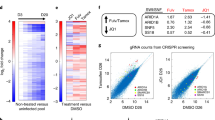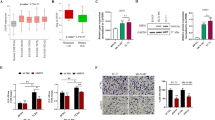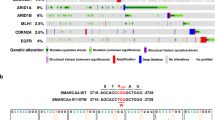Abstract
Resistance to targeted therapies is a major problem in cancer treatment. The epidermal growth factor receptor (EGFR) antibody drugs are effective in a subset of colorectal cancers, but the molecular mechanisms of resistance are understood poorly. Genes involved in epigenetic regulation are frequently deregulated in cancer, raising the possibility that such genes also contribute to drug resistance. Using a focused RNA interference library for genes involved in epigenetic regulation, we identify sirtuin2 (SIRT2), an NAD+-dependent deacetylase, as a modulator of the response to EGFR inhibitors in colon and lung cancer. SIRT2 loss also conferred resistance to BRAF and MEK inhibitors in BRAF mutant melanoma and KRAS mutant colon cancers, respectively. These results warrant further investigation into the potential role of SIRT2 in resistance to drugs that act in the receptor tyrosine kinase-RAS-RAF-MEK-ERK signaling pathway.
This is a preview of subscription content, access via your institution
Access options
Subscribe to this journal
Receive 50 print issues and online access
$259.00 per year
only $5.18 per issue
Buy this article
- Purchase on Springer Link
- Instant access to full article PDF
Prices may be subject to local taxes which are calculated during checkout




Similar content being viewed by others
References
Saltz LB, Meropol NJ, Loehrer PJ Sr, Needle MN, Kopit J, Mayer RJ . Phase II trial of cetuximab in patients with refractory colorectal cancer that expresses the epidermal growth factor receptor. J Clin Oncol 2004; 22: 1201–1208.
Cunningham D, Humblet Y, Siena S, Khayat D, Bleiberg H, Santoro A et al. Cetuximab monotherapy and cetuximab plus irinotecan in irinotecan-refractory metastatic colorectal cancer. N Engl J Med 2004; 351: 337–345.
De Roock W, Claes B, Bernasconi D, De Schutter J, Biesmans B, Fountzilas G et al. Effects of KRAS, BRAF, NRAS, and PIK3CA mutations on the efficacy of cetuximab plus chemotherapy in chemotherapy-refractory metastatic colorectal cancer: a retrospective consortium analysis. Lancet Oncol 2010; 11: 753–762.
Andreyev HJ, Norman AR, Cunningham D, Oates J, Dix BR, Iacopetta BJ et al. Kirsten ras mutations in patients with colorectal cancer: the ‘RASCAL II’ study. Br J Cancer 2001; 85: 692–696.
Samowitz WS, Curtin K, Schaffer D, Robertson M, Leppert M, Slattery ML . Relationship of Ki-ras mutations in colon cancers to tumor location, stage, and survival: a population-based study. Cancer Epidemiol Biomarkers Prev 2000; 9: 1193–1197.
Geutjes EJ, Bajpe PK, Bernards R . Targeting the epigenome for treatment of cancer. Oncogene 2012; 31: 3827–3844.
Jones S, Wang TL, Shih IeM, Mao TL, Nakayama K, Roden R et al. Frequent mutations of chromatin remodeling gene ARID1A in ovarian clear cell carcinoma. Science 2010; 330: 228–231.
Reisman DN, Sciarrotta J, Wang W, Funkhouser WK, Weissman BE . Loss of BRG1/BRM in human lung cancer cell lines and primary lung cancers: correlation with poor prognosis. Cancer Res 2003; 63: 560–566.
Liu H, Cheng EH, Hsieh JJ . MLL fusions: pathways to leukemia. Cancer Biol Ther 2009; 8: 1204–1211.
Marschalek R . Mechanisms of leukemogenesis by MLL fusion proteins. Br J Haematol 2011; 152: 141–154.
Kleer CG, Cao Q, Varambally S, Shen R, Ota I, Tomlins SA et al. EZH2 is a marker of aggressive breast cancer and promotes neoplastic transformation of breast epithelial cells. Proc Natl Acad Sci USA 2003; 100: 11606–11611.
Varambally S, Dhanasekaran SM, Zhou M, Barrette TR, Kumar-Sinha C, Sanda MG et al. The polycomb group protein EZH2 is involved in progression of prostate cancer. Nature 2002; 419: 624–629.
Sharma SV, Lee DY, Li B, Quinlan MP, Takahashi F, Maheswaran S et al. A chromatin-mediated reversible drug-tolerant state in cancer cell subpopulations. Cell 2010; 141: 69–80.
Berns K, Horlings HM, Hennessy BT, Madiredjo M, Hijmans EM, Beelen K et al. A functional genetic approach identifies the PI3K pathway as a major determinant of trastuzumab resistance in breast cancer. Cancer Cell 2007; 12: 395–402.
Prahallad A, Sun C, Huang S, Di Nicolantonio F, Salazar R, Zecchin D et al. Unresponsiveness of colon cancer to BRAF(V600E) inhibition through feedback activation of EGFR. Nature 2012; 483: 100–103.
Kim HS, Vassilopoulos A, Wang RH, Lahusen T, Xiao Z, Xu X et al. SIRT2 maintains genome integrity and suppresses tumorigenesis through regulating APC/C activity. Cancer Cell 2011; 20: 487–499.
Huang S, Holzel M, Knijnenburg T, Schlicker A, Roepman P, McDermott U et al. MED12 controls the response to multiple cancer drugs through regulation of TGF-beta receptor signaling. Cell 2012; 151: 937–950.
Yeung F, Ramsey CS, Popko-Scibor AE, Allison DF, Gray LG, Shin M et al. Regulation of the mitogen activated protein kinase kinase (MEK)-1 by NAD+-dependent deacetylases. Oncogene (This issue).
Wiegand KC, Shah SP, Al-Agha OM, Zhao Y, Tse K, Zeng T et al. ARID1A mutations in endometriosis-associated ovarian carcinomas. N Engl J Med 2010; 363: 1532–1543.
Jiao Y, Shi C, Edil BH, de Wilde RF, Klimstra DS, Maitra A et al. DAXX/ATRX, MEN1, and mTOR pathway genes are frequently altered in pancreatic neuroendocrine tumors. Science 2011; 331: 1199–1203.
Gui Y, Guo G, Huang Y, Hu X, Tang A, Gao S et al. Frequent mutations of chromatin remodeling genes in transitional cell carcinoma of the bladder. Nat Genet 2011; 43: 875–878.
Glasspool RM, Teodoridis JM, Brown R . Epigenetics as a mechanism driving polygenic clinical drug resistance. Br J Cancer 2006; 94: 1087–1092.
Barber MF, Michishita-Kioi E, Xi Y, Tasselli L, Kioi M, Moqtaderi Z et al. SIRT7 links H3K18 deacetylation to maintenance of oncogenic transformation. Nature 2012; 487: 114–118.
Sebastian C, Zwaans BM, Silberman DM, Gymrek M, Goren A, Zhong L et al. The histone deacetylase SIRT6 is a tumor suppressor that controls cancer metabolism. Cell 2012; 151: 1185–1199.
Tol J, Koopman M, Cats A, Rodenburg CJ, Creemers GJ, Schrama JG et al. Chemotherapy, bevacizumab, and cetuximab in metastatic colorectal cancer. N Engl J Med 2009; 360: 563–572.
Brummelkamp TR, Fabius AW, Mullenders J, Madiredjo M, Velds A, Kerkhoven RM et al. An shRNA barcode screen provides insight into cancer cell vulnerability to MDM2 inhibitors. Nat Chem Biol 2006; 2: 202–206.
Huang S, Laoukili J, Epping MT, Koster J, Holzel M, Westerman BA et al. ZNF423 is critically required for retinoic acid-induced differentiation and is a marker of neuroblastoma outcome. Cancer Cell 2009; 15: 328–340.
Acknowledgements
We are grateful to Kees Punt, Sabine Tejpar, Josep Tabernero, Jose Jimenez, Adriana López-Dóriga Guerra, Ramon Salzar and Loredana Vecchione for providing clinical specimen of cetuximab-treated colon cancers. We thank Gerrit Hooiger and Marc van de Vijver (AMC, Amsterdam) for assistance in staining tissue microarrays and Alberto Bardelli for the kind gift of the Difi cells. We thank the NKI Genomics Core Facility, especially Iris de Rink, for support. We also thank Chong Sun and Sidong Huang for helpful discussions. This work was supported by grants from the Dutch Cancer Society (KWF) and the European Union Seventh Framework Program COLTHERES project, grant agreement 259015.
Author information
Authors and Affiliations
Corresponding author
Ethics declarations
Competing interests
The authors declare no conflict of interest.
Additional information
Supplementary Information accompanies this paper on the Oncogene website
Rights and permissions
About this article
Cite this article
Bajpe, P., Prahallad, A., Horlings, H. et al. A chromatin modifier genetic screen identifies SIRT2 as a modulator of response to targeted therapies through the regulation of MEK kinase activity. Oncogene 34, 531–536 (2015). https://doi.org/10.1038/onc.2013.588
Received:
Revised:
Accepted:
Published:
Issue Date:
DOI: https://doi.org/10.1038/onc.2013.588
Keywords
This article is cited by
-
Current understanding of epigenetics role in melanoma treatment and resistance
Cancer Cell International (2022)
-
Low levels of pyruvate induced by a positive feedback loop protects cholangiocarcinoma cells from apoptosis
Cell Communication and Signaling (2019)
-
SIRT6 haploinsufficiency induces BRAFV600E melanoma cell resistance to MAPK inhibitors via IGF signalling
Nature Communications (2018)
-
O-GlcNAcylation regulates breast cancer metastasis via SIRT1 modulation of FOXM1 pathway
Oncogene (2017)



